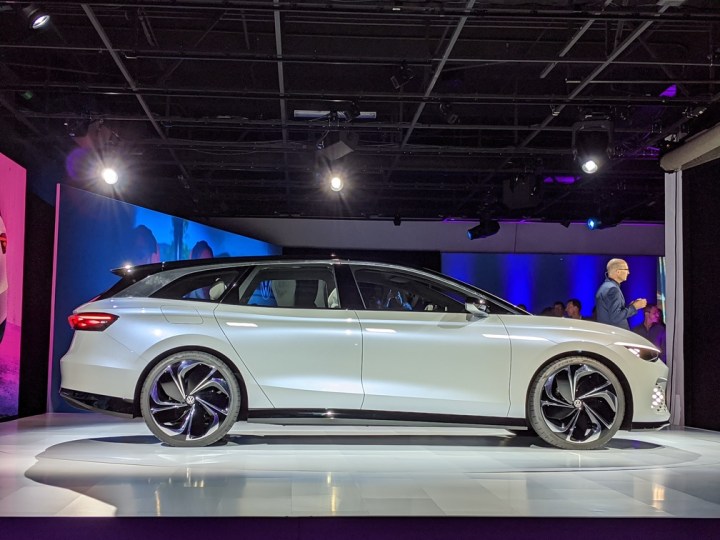
Volkswagen unveiled yet another concept car in its ID series of electric vehicles at the 2019 Los Angeles Auto Show. With previous ID concepts showcasing hatchback, crossover, and even dune buggy designs, you’d think VW would be out of ideas. But the Volkswagen ID.Space Vizzion promises something different. Previewing a possible production model that could launch in 2021, Volkswagen claims it will defy categorization.
The ID.Space Vizzion will combine “the aerodynamic characteristics of a Gran Turismo with the spaciousness of an SUV,” according to Volkswagen. The concept car has a tall, upright roofline, but without the ground clearance normally associated with SUVs. It looks a bit like the recently discontinued Ford Flex, which also tried to combine car and SUV styling elements. It also means the ID.Space Vizzion looks a bit like a minivan without sliding doors.
In addition to providing plenty of interior space, Volkswagen claims the design is aerodynamically efficient. This, along with an 82-kilowatt-hour battery pack, will allow the ID.Space Vizzion to achieve 300 miles of range on the Environmental Protection Agency testing cycle, VW claims. Only Tesla has managed to top 300 miles of range so far, although Ford and Fisker claim they will hit that target with their upcoming electric SUVs.
However, that 300-mile range only applies to one version of the ID.Space Vizzion. In L.A., Volkswagen is showing a rear-wheel drive version with a single electric motor producing 275 horsepower and 406 pound-feet of torque. That’s the version that gets 300 miles of range, according to VW. But the automaker said it’s also possible to fit a second motor to the front axle, giving the car all-wheel drive. The front motor brings total system output up to 335 hp, Volkswagen claims. VW didn’t quote a range estimate for the all-wheel drive model, but said that version could do zero to 60 mph in 5.0 seconds, with an electronically limited top speed of 109 mph.

The interior of the ID.Space Vizzion has a Tesla-like minimalist look, with a 15.6-inch touchscreen right in the center of the dashboard. The materials all come from sustainable sources, according to Volkswagen. The seats are upholstered in “AppleSkin” — which is exactly what it sounds like: Apple skins left over from apple juice production are turned into interior materials. The driver uses a head-up display for most functions, making the tiny instrument cluster largely redundant. VW also installed a light strip that gives prompts for things like phone calls and navigation directions.
The ID.Space Vizzion shares the Volkswagen MEB platform with the previous six ID-series concept cars. The first MEB-based production model — the ID.3 hatchback — just entered production in Germany. The ID.3 won’t be sold in the United States, but we will get a crossover based on the ID.Crozz concept in late 2020. The U.S. is also slated to get a production version of the ID.Buzz concept, which is based on the classic VW Microbus.

Volkswagen previously confirmed plans for a production version of the ID.Space Vizzion, but then appeared to walk back those plans. The automaker first said a production model would launch in 2021, but a subsequent press release only described the ID.Space Vizzion as a “potential production car” for Europe and North America, with no mention of the 2021 launch date. Given U.S. carbuyers’ current obsession with crossovers, it makes sense for VW to bring the ID.Space Vizzion here. While Volkswagen does plan to start building electric cars at its Chattanooga, Tennessee, factory in 2022, it’s unclear if the ID.Space Vizzion would be one of the models produced locally.
Updated on November 19, 2019: Added full details of the ID.Space Vizzion concept.
Editors' Recommendations
- Volkswagen ID.GTI concept is another icon reimagined as an EV
- Buick announces plan to go all-electric with stunning EV concept
- Volkswagen’s electric ID.Life concept car doubles as a gaming console
- Polestar’s Precept concept is an electric fastback with a recycled interior
- New Hyundai Ioniq electric vehicle gets big boosts in range and horsepower


